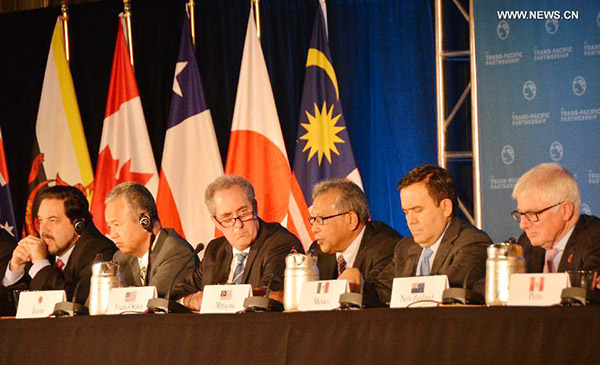 |
|
Trade ministers of the United States and 11 other Pacific Rim countries attend a press conference after negotiating the Trans-Pacific Partnership (TPP) trade agreement in Atlanta, the United States, on Oct. 5, 2015. Trade ministers of the United States and 11 other Pacific Rim countries "have successfully concluded" the Trans-Pacific Partnership (TPP) free trade talks, U.S. Trade Representative Michael Froman said Monday. [Photo/Xinhua] |
When US Commodore Matthew Perry steamed into Japan's Edo (now Tokyo) Bay with his "black ships of evil mien" on July 8, 1853, he forced open Japan, which the Tokugawa shoguns had run for 250 years as a reclusive feudal state.
The country is opening up again 162 years later, this time to another 11 countries, with an agreement reached on the Trans-Pacific Partnership free trade initiative.
For some of the countries, though, the TPP is more than just a trade deal. The United States and Japan have made no secret of its geopolitical implications for competing with, if not confronting, China.
Shortly after the broad agreement on the TPP was reached, the White House declared that the US does not want competitors, such as China, who don't share its values, to write the rules of the global economy.
The US wants to ensure that Washington, not Beijing, has the leadership in the development of trade rules governing the Asia-Pacific region.
Japanese minister of economic revitalization Akira Amari, who took charge of the country's TPP negotiations emphasized the significance of the trade deal to keep the US pegged to East Asia so that its continued presence will prevent China's military buildup from destabilizing the region.
Participants in the TPP talks account for a combined 40 percent of the world's gross domestic product. Joining a free trade regime of such a scale would be significant for Japan. Japan's government estimates the economy will expand by 0.66 percent as a result of the elimination of tariffs. When non-tariff deregulation is included, the economic benefits would be larger, probably to the tune of 2 percent of GDP.
This requires a long-overdue opening and restructuring of Japan's protected but lackluster economy.
To stoke its economic growth and promote the interests of domestic consumers, Japan needs to liberalize trade and investment to capitalize on the economic vigor of other nations, especially those in the fast-growing Asian region.
For Abe, the TPP provides a geopolitical counterweight to a rising China. The Abe administration, which plays up China's growing threat in East Asia, views the TPP as a key component of deepening Japan's alliance with the US alongside closer bilateral security ties.
It is obvious that the pact is an alliance in which some nations build to isolate two Asian powers - China and Russia.
Japan's Diet or parliament has approved the new security-related bills giving the cabinet the authority to send troops overseas despite Article 9 of the country's pacifist Constitution banning the settlement of international conflicts by force.
On top of economic interests, the Abe administration has pursued the TPP deal with an eye on aligning Japan's position with the US strategy vis-a-vis China.
The American nuclear-powered aircraft carrier USS Ronald Reagan docked at its new home in Japan's Yokosuka naval port on Oct 1 just as Tokyo is seeking to deepen defense ties with the US under new security laws. With a crew of 5,000 and up to 90 aircrafts on board, the largest vessel in the US Navy replaced the USS George Washington, which was the first US nuclear-powered warship based in Japan. The US Navy plans to deploy 60 percent of its 300 vessels in the Pacific by 2020.
The TPP, the US economic pivot to Asia, will be a shot in the arm for Japan. The country, however, will cause tension in the region if it overplays its hand geopolitically.
The author is China Daily's Tokyo bureau chief.
caihong@chinadaily.com.cn

I’ve lived in China for quite a considerable time including my graduate school years, travelled and worked in a few cities and still choose my destination taking into consideration the density of smog or PM2.5 particulate matter in the region.